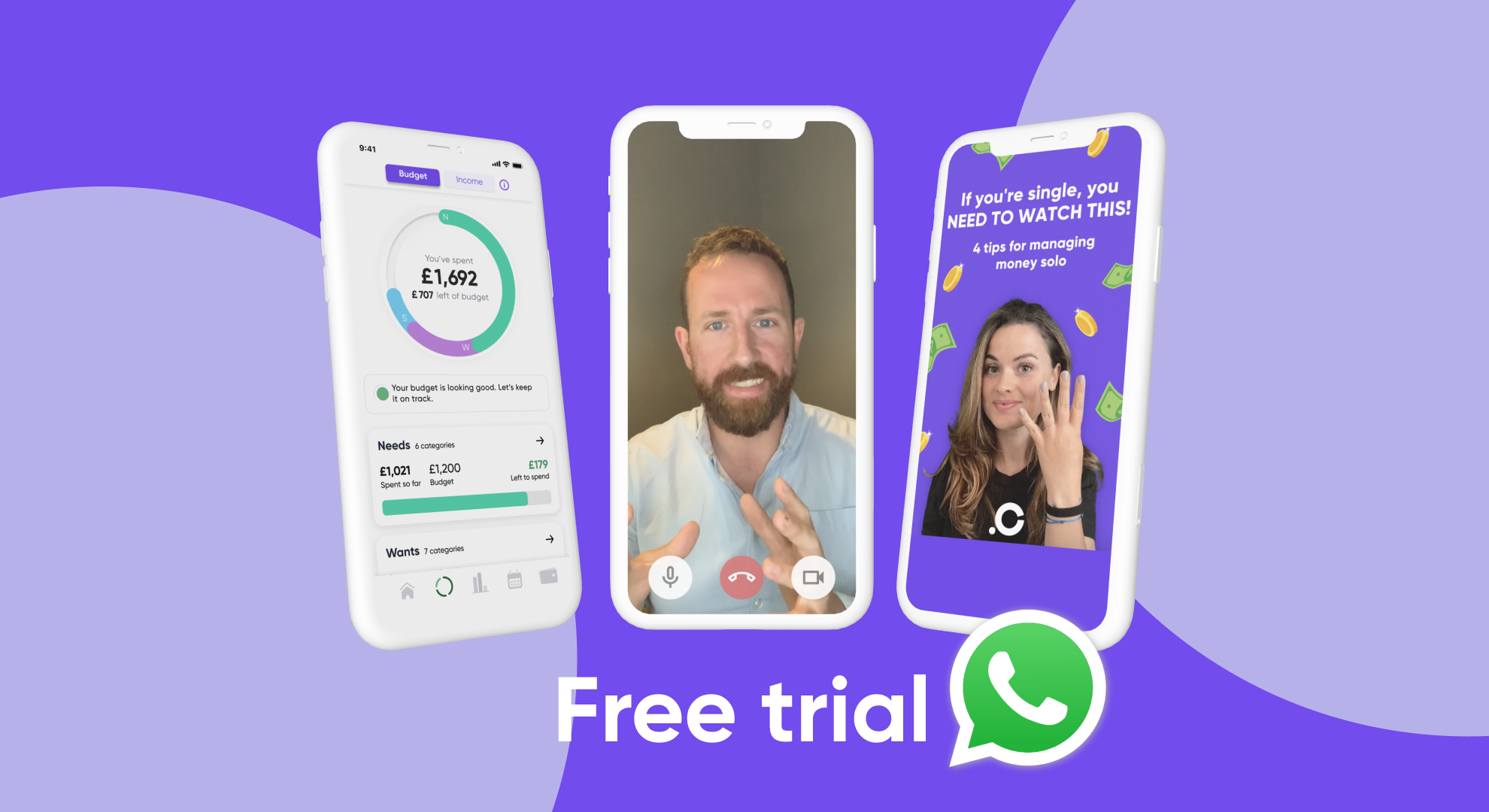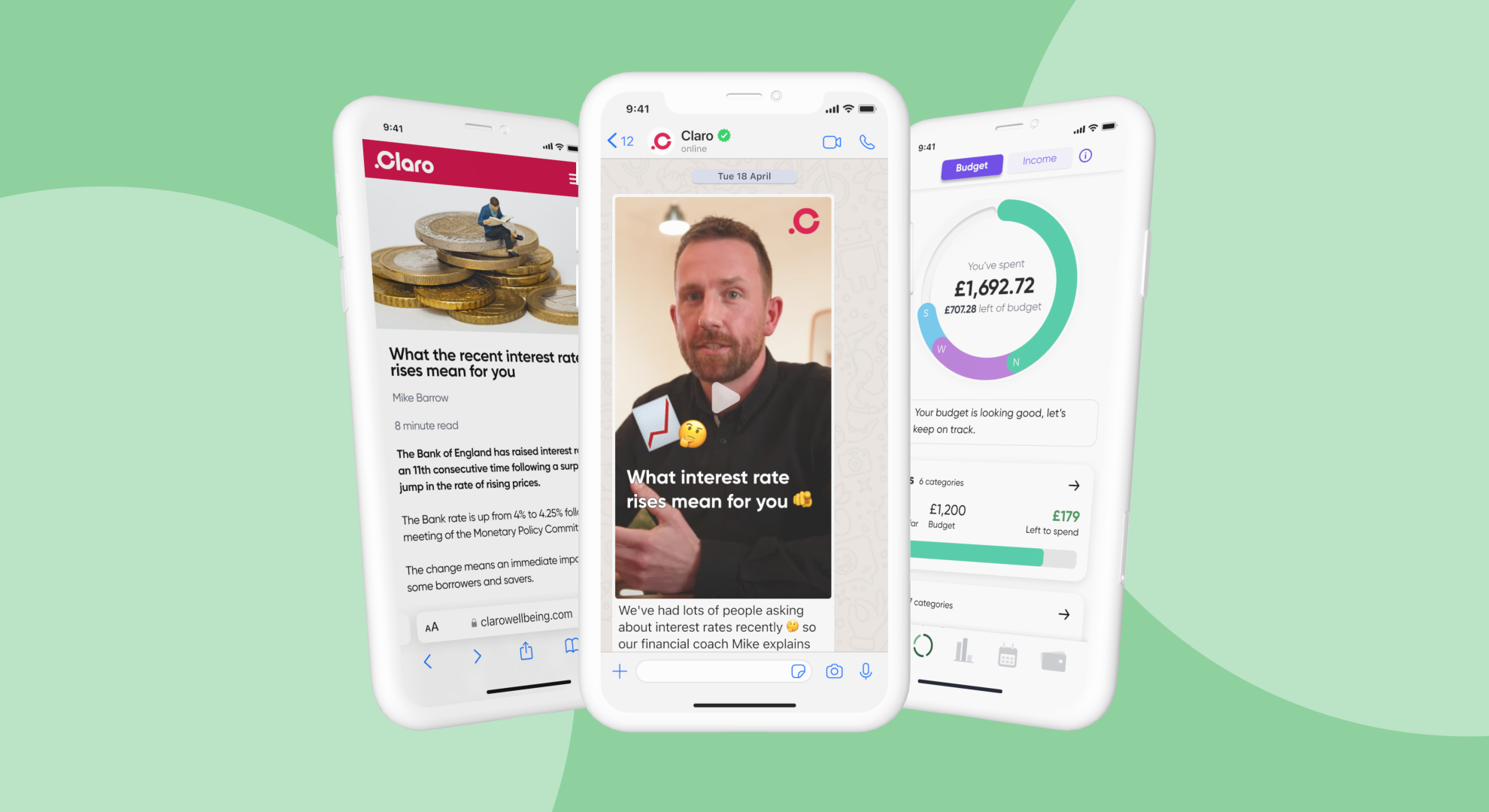6 min read
Should employers acknowledge Blue Monday?
Blue Monday (15 January) has a mixed reputation. But there’s still value in using the day to raise awareness of mental health and wellbeing...

A financial coaching session can seem daunting to the uninitiated. What happens throughout? Does the coach have a whistle? Are there half-time refreshments? Do you sing the national anthem beforehand?
To get a first-hand account of how a financial coaching session typically goes, we sat down with two of Claro Wellbeing’s in-house financial coaches, Mike Barrow and Stacey Lowman. They generously shared their experiences including some recurring themes they’ve noticed during financial coaching sessions and some heartwarming success stories from their conversations with clients.
Mike: “This could be put into two camps. The first is where people that have this overarching feeling of, unfortunately, desperation or not having control over their finances and they just want to start gaining some control. They could be in debt or not have any emergency savings. They might struggle to make their money last until the end of the month, have emotional spending habits and other things relating to financial resilience.
“There's another half of coaching clients that have a relatively good understanding of money and their own financial situation, so it's about optimising that. A common goal we come across is buying your first property in the UK. Some people may go beyond that and start looking into investing in buy-to-let properties either directly or through real estate investment trusts. People also want to look at workplace pensions, pensions in general or retirement planning.”
Stacey: “Every financial coaching relationship is different, but there are certainly popular goals that people in the UK want to work towards and challenges or barriers that keep coming up. We often see people looking to buy their first home, to start investing or to build their financial resilience and confidence. We also see people looking to build a better awareness of their current relationship with money or make changes to mindsets that might be holding them back. Everyone that’s coming to a financial coaching course wants to improve their financial education and their financial literacy. They want to feel confident with whatever their goal is and to have options and a plan in place to achieve that.”
Mike: “One of the early clients I had at Claro Wellbeing was someone that had basically lost all hope. They weren't in a massively bad situation, or one that they couldn't get out of. But due to their experiences and beliefs about themselves and the amount of time that they'd spent trying unsuccessfully to fix things, they weren’t feeling too positive. They were giving it one last chance to see what we could offer through financial coaching and over the 45 minutes that we spent throughout that session, I could slowly see her face lighting up and believing in herself again. She was actually one of the first people that at the end of a session couldn’t believe what we'd done. She used the analogy of seeing lights at the end of the tunnel, which always sticks with me.
“She actually emailed me a few months after the session to say that she'd implemented some of the things we spoke about and it made a massive difference. It was the first time that she's ever had this belief in herself, and then coincidentally, she'd also applied for a new job and been accepted and her salary increased quite a bit, so that was going to make everything else that we've spoken about a lot easier for the future.
“All I did was spend an hour of time with someone speaking about concepts which may have initially seemed complicated, but ended up being very doable, and making it individual to their situation. Sometimes the noise needs to be cancelled out to funnel the information towards somebody in a way that makes sense to them. It’s a good example of why I got into financial coaching in the first place.”
Stacey: “One is a real story in how earning a good salary can often mask poor financial behaviours. A client came to me who was earning (including bonuses and equity and things like that) close to a six-figure salary, but had very little in terms of an emergency fund or savings and wasn't yet investing for themselves, even though they worked in that sector. We worked together over five or six sessions and by the end of that time, they had saved their target emergency fund of £10,000, they had set up an automated budget for themselves and were consistently saving or investing 30% of their salary every month and had an upcoming bonus. For the first time ever, they already had a plan as to where they were going to allocate that bonus money before it hit their account.
“That was all done through identifying behavioural changes around seeing how much they spend on convenience, then realising the impact of those changes and coming up with alternatives to reduce the temptation for that spending going forward. They built specific goals for savings and investing, putting personal motivation and vision behind all of these goals to give them the motivation to actually work towards them.
“Another successful client story was a young mother who had recently started a new job before she got pregnant and was only a few months away on maternity leave when she found out they weren't going to be giving her any more maternity pay. We did some specific work to understand what she was entitled to and through research and sharing some application forms with her, she was able to identify that she had 12 weeks of backpay that she was entitled to. So she received that and it really reduced the stress around being able to provide for her two young kids and given that it was towards the end of the year, receiving the money meant that she could make a Christmas to remember for her little ones, which was a really lovely ending to the story.”
Mike: “Before a session, believe it or not, I'll quite often feel slightly nervous. I know this sounds very cliché, but I care to the point where I don't just want to go through every session with a one-size-fits all approach. You have to be on your game and you have to make sure that the session is well delivered and is of value to the client. You then naturally go through the session, build that rapport and then afterwards there's this sense of calm, a level of satisfaction most of the time.”
Stacey: “Sometimes after a coaching session, I feel really energised because we've made progress and there's a plan in place. We've demonstrated if they go through with this plan, here’s what they're going to achieve at the end of it. I feel that there's motivation and accountability there that the client feels good about going away to actually do the work.
“Other times I feel apprehensive because there's so many different directions that a financial coaching session can go in. It's not realistic to expect a light bulb moment to happen in every coaching session, particularly if you're working with someone who hasn't yet got that financial confidence or the financial knowledge that they want or that they need. It can take time to establish that rapport and trust to get clear on what the barriers are that we need to overcome. These conversations can really stay with you and it can take a few sessions with a client to find that breakthrough moment, so it’s good to be aware of that when you really care about supporting them and helping them make a difference.”
Mike: “Employers should offer financial coaching to their staff purely from a win-win point of view of the company. If someone is worrying about their finances at work, they’re going to be distracted from what they're doing. They're not going to be as productive as they could be.
“Not only does providing a financial coaching service or something similar get rid of or help combat that fundamental stress, but it also shows that you care as an employer. Getting to the point where you show that you care about the employee as much as the overarching mission objective, knowing that the people are what make your company, it's going to be all the better for productivity and staff retention to show that. Staff are aware of how much you care about them. You can get rid of any toxic negativity that's potentially spreading throughout the office environment by showing that you care about their wellbeing.”
Stacey: “From the research that Claro Wellbeing has done, it makes sense in the current environment of the cost of living crisis, post-pandemic. Financial wellbeing is one of the top concerns that employees have. Many of us are worried about being able to support our family, our job security, our lifestyle and whether we need to make changes - and financial concerns are at the very heart of all of those worries. People take this stress with them to work, and they can't just switch it off. Of course, those things have an impact on how people feel at work and how they perform, and financial concerns are inextricably linked to our general wellbeing at home and in the workplace.
“I really think that financial wellbeing - from financial coaching and other educational resources that improve people’s financial confidence - will become a really core part of any benefits package in the workplace. That’s not just because employees are asking for it, but because employers are really recognizing the benefits of offering it now, too.”

6 min read
Blue Monday (15 January) has a mixed reputation. But there’s still value in using the day to raise awareness of mental health and wellbeing...

4 min read
Ever wished you had a money-whiz friend you could ask anything, as often as you like?

7 min read
Millions are being impacted by financial stress. Yet, until now, workers in frontline occupations have not been able to benefit from educational...